One of the best things about being a full-time RVer is the ability to be spontaneous.
But when it comes to living full-time in an RV for the winter, you’ll want to do some planning and preparation to keep from freezing your tail off.
I know this because I’ve been there…
My wife and I had been RVing for 3+ years and we’d started with the dream of chasing 70 degrees everywhere we went in our RV.
And yet, here we were in the middle of January, sitting in sunny Arizona and hitching up for a long drive to freezing Northern Kentucky.
Our RV trip from warm to cold made us ask ourselves: How do you live and camp full-time in an RV in the winter?
Despite our uncertainty, we discovered that living full-time in an RV during the winter was not only doable, it could even be enjoyable with the right tactics.
To live full-time in an RV in the winter, you need the following:
- A heated water hose (or you can rely on the internal water pump in your RV).
- An internal propane heater in your RV.
- 1-2 electric space heaters.
- Warm clothes and blankets (you can keep the RV warm in the winter, but these help).
- A way to keep tanks and pipes warm (some RVs are 4 season and already have heaters for these areas).
By equipping yourself with the above tools to live full-time in an RV in the winter, you can open the door to new and exciting adventures while winter camping.
Below, I’ll share my story about how we lived in our RV full-time during the winter, the tools we used to keep ourselves warm, and the tactics we employed to make sure we didn’t damage our RVs pipes or tanks due to freezing temperatures.
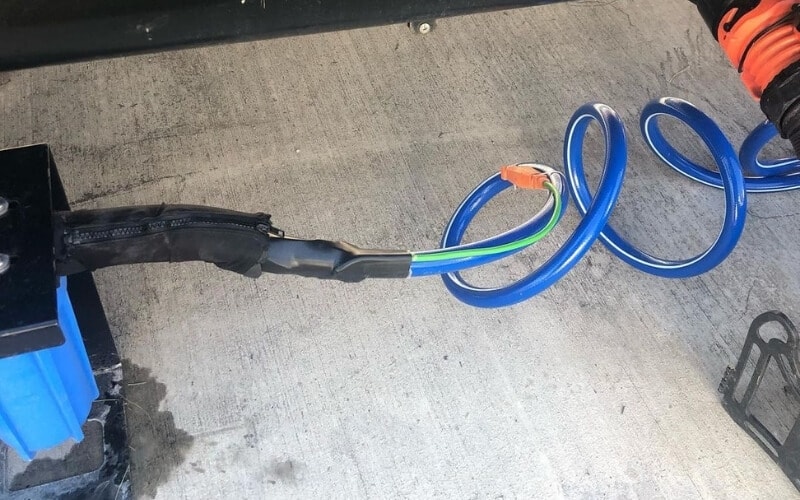
Tips For Living In Your RV During The Winter
Here’s our best winter RV living tips to prepare your rig to stay warm when it’s freezing outside.
1: Use A Heated Water Hose Or Your RV’s Water Pump
A heated water hose like this one is a must if you plan to hook to city water in your RV during the winter.
My wife and I learned this the hard way when we were still in Williams, AZ. Even though it was warm and sunny during the day, the temperature dropped below freezing at night — meaning our hose wasn’t letting water flow in the morning.
If you live full time in your RV during the winter, you’ll always have to deal with frozen hoses unless you have a heated hose.
NOTE: Just because you have a heated hose does not mean that the campground pipes won’t freeze during the winter.
If the campground you’re at hasn’t taken precautions to keep pipes from freezing or if you don’t want to buy a heated hose, you could do the following:
Use your RV’s water pump instead of a hose
Because your RV fresh water tank is internal, it will be less susceptible to freezing than an exposed water hose. RV makers usually also run heat ducts near the tank to help keep it warm.
By simply using your internal pump, you can eliminate the problem of a frozen hose.
But beware though, when my wife and I did this it seemed like we always ran our tank dry in the middle of the night when it was freezing outside…
So, don’t be us and proactively fill up your freshwater tank to avoid this late night catastrophe.
Let water dribble from a faucet
If you leave a water faucet open just enough for water to drip, this will cause water to flow through the hose and into your RVs pipes.
Flowing water is very hard to freeze, so this will usually keep you covered in a pinch.
Caution: Use this option only as a last resort because it is very wasteful and doesn’t guarantee that sensitive pipes like your toilet pipes won’t freeze over.
Also, if you don’t have your grey tank open to drain, you’ll fill it up overnight with the above plan.
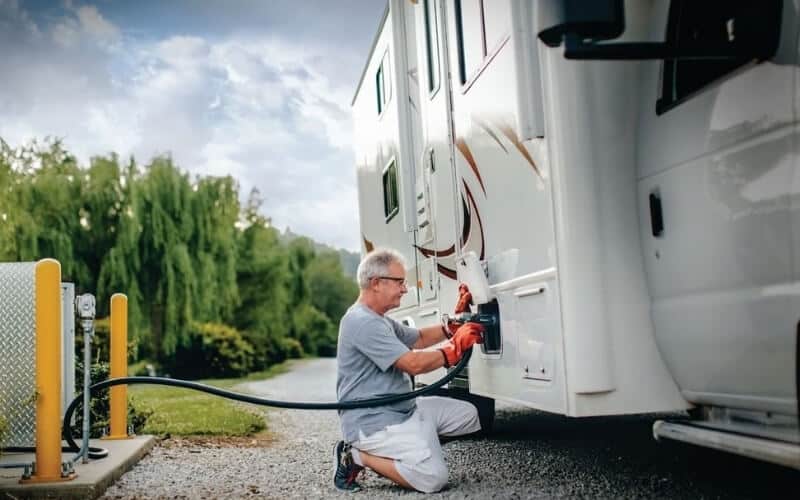
2: Keep That Propane Topped Up!
When you live full-time in an RV during the winter, you’ll burn through propane much more quickly than you’re used to.
I remember when my wife and I first discovered this…
It was about 3am on a cold Kentucky night. I’d just filled my propane tanks about 4 days before and I was used to them lasting me nearly a month!
So, you can imagine my shock and dismay when I awoke to an ice-cold RV.
This happened because I didn’t realize just how much more propane I was using to keep my RV heater running during the winter. I’d run out of propane in the middle of the night and my heater was just blowing cold air.
Don’t be like me — instead, keep an eye on those propane levels and fill them up frequently.
If you push this, I guarantee you your propane won’t run out in the middle of the day when fill stations are open. Instead, it’ll run out in the middle of the night when you’re freezing your tail off and there’s nothing you can do about it.
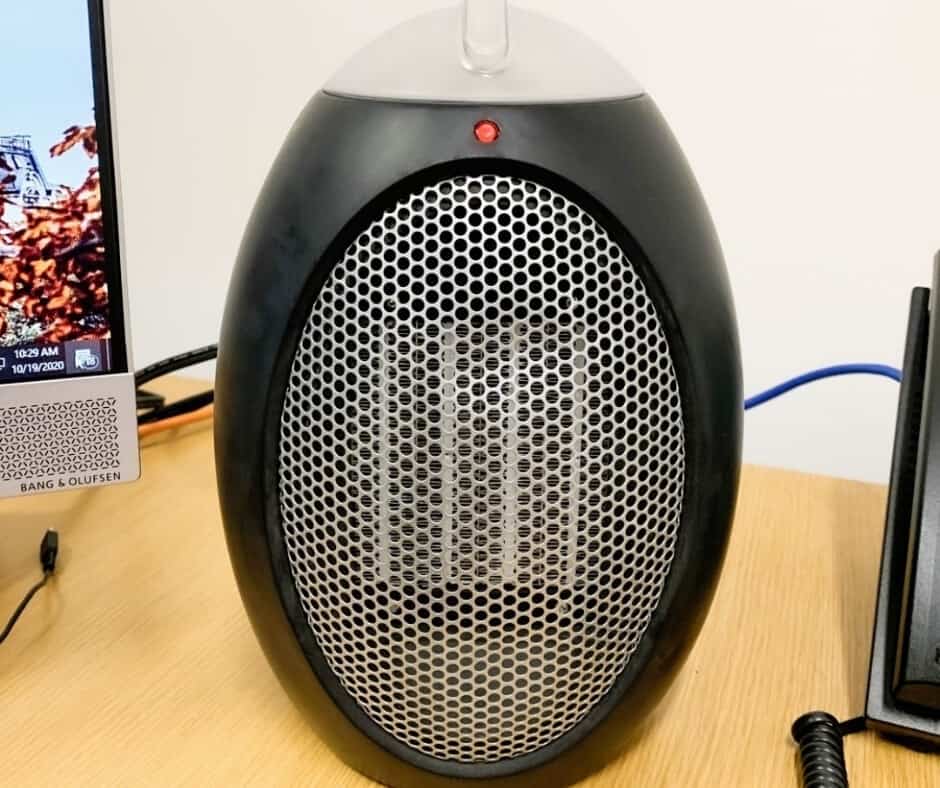
3: Electric Space Heater(s) Are A MUST
When you live in your RV full-time in the winter, your RV’s propane heater will do a great job of efficiently and evenly heating your RV.
But my wife and I found that some areas of the RV (like our bedroom) needed an extra boost of heat to help out.
That’s why you should plan to have an electric space heater for winter camping.
Generally speaking, you should not try to run more than 1 electric heater in a 30amp RV because space heaters pull a lot of juice and can trip your breaker.
50amp RVs are capable of running more than one space heater as long as you don’t have other energy hungry appliances running.
4: Protect Your Pipes and Tanks
If you have a true 4 season RV, you’ll be able to live in it full-time in the winter without too much trouble.
That’s because your water and dump tanks will be heated and your heat ducts will go all around your water pipes.
But my wife and I (like many RVers around the world) don’t have a 4 season camper.
We have a vintage Airstream which — beautiful as they may be — are not known for withstanding harsh winters.
So, if you’re like me, you’ll have to take some additional precautions:
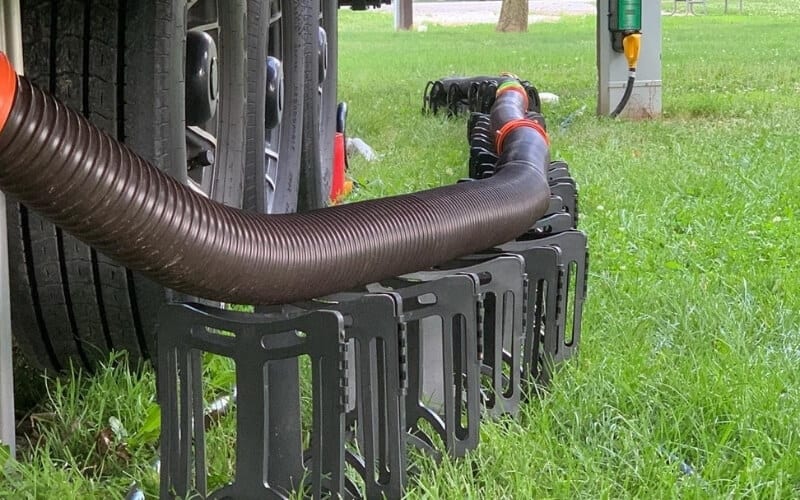
5: Use A Hose Ladder For Your RV Sewer Hose
Sewer hose ladders will keep your sewer hose from bunching up so drain water can flow quickly down the chute.
If you don’t use a ladder, your sewer hose might bunch up or leave standing “water” inside it.
Standing water + winter temps = frozen water.
And trust me — the last thing you want is frozen poo in your sewer hose when you’re trying to live full-time in your RV in the winter.
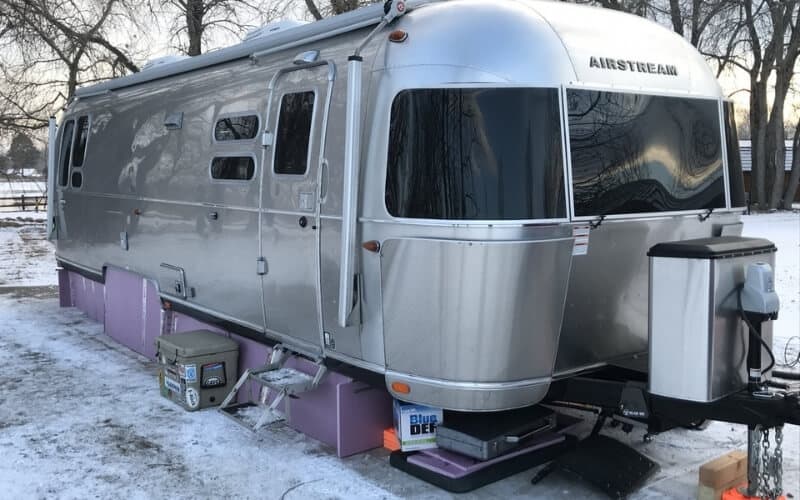
6: Put A Skirt On Your RV
When we left sunny Arizona for cold Kentucky, we arrived to a peculiar thing at our winter campground…
People had skirts on their RVs!
These skirts would wrap all around a camper to cover up the entire underbelly. While it looked a little weird, we quickly figured out that this is a great way to keep an RV warm in the winter.
While not a requirement for living full-time in your RV in the winter, if you can find a way to cover the underside, you’ll prevent cold air from getting under your RV.
And that goes a long way to keeping you and yours warm while camping in the winter.
7: Insulate Your Camper Windows
When wifey and I took our first foray into winter camping, we quickly realized that cold winter winds will blow through RV windows like a hurricane.
After we turned to popsicles one night, we vowed to fix this pesky situation.
It turns out the solution is fairly simple — all you need to do to insulate your windows when you live full-time in an RV for the winter is grab some foil bubble or foam insulation, cut it to fit your windows, and then wrap it in nice looking fabric.
This simple solution makes your windows look stylish and will go a long way to keeping you warm while winter camping.
8: Stock Up On Warm Clothes
While you don’t need to live like poor Bob Cratchit in A Christmas Carol, you will want a wardrobe that’ll allow you to brave some cooler temps.
When living in your RV full-time in the winter, you’ll be able to keep it warm, but not as warm as your house.
You won’t be able to scamp around in shorts and a T-Shirt when it’s freezing outside your RV (I always used to do that at my regular home because it was so much easier to heat my well-insulated house).
Instead, grab some thin thermal undergarments, thick socks, and comfy sweaters to keep comfy while winter camping.
8: Thermal Sleeping Bags And/Or Duvets Are Your Best Friend
Even though your RV will stay relatively warm on winter nights, it likely won’t be as warm as you’re used to.
That’s why it pays to have a thermal sleeping bag or thick duvet that you use to keep warm and toasty in bed.
9: Don’t Forget The Healing Powers Of Hot Cocoa
Hot cocoa is that wonderful elixir that you should never be without while living in your RV full-time in the winter.
Keep a supply at the ready to warm body and soul while you brave those winter months in your RV.
When my wife and I decided to live full-time in our RV for that northern Kentucky winter, we had no idea what we were in for.
We quickly took a crash course on all things winter camping. Along the way, we realized that it could be quite fun.
But we hope you don’t have to make the same mistakes we did and that you use our tips above to make sure winter camping goes well for you and the family.

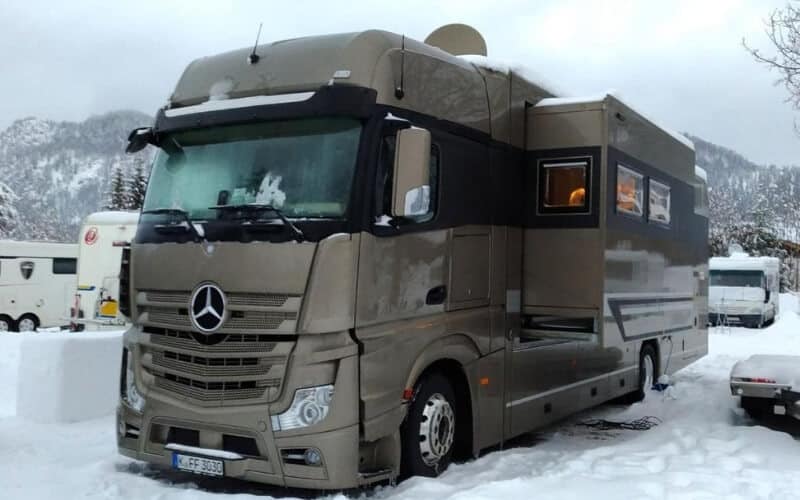
![6 Best DIY Teardrop Trailer Kits in [currentyear]: Top Rated Teardrop Camper Kits 2 The 6 Best Teardrop Trailer Kits](https://www.rvingknowhow.com/wp-content/uploads/2021/09/The-6-Best-Teardrop-Trailer-Kits-150x150.jpg)
![How To Winterize Your RV Camper [A Step-by-Step Guide] 3 How Do You Winterize an RV](https://www.rvingknowhow.com/wp-content/uploads/2021/01/How-Do-You-Winterize-an-RV-150x150.jpg)
![6 Best Four Season Fifth Wheel RVs for Full-Time Living in [currentyear] 4 Best Four Season Fifth-Wheel Trailers](https://www.rvingknowhow.com/wp-content/uploads/2021/12/Best-Four-Season-Fifth-Wheel-Trailers.jpg)
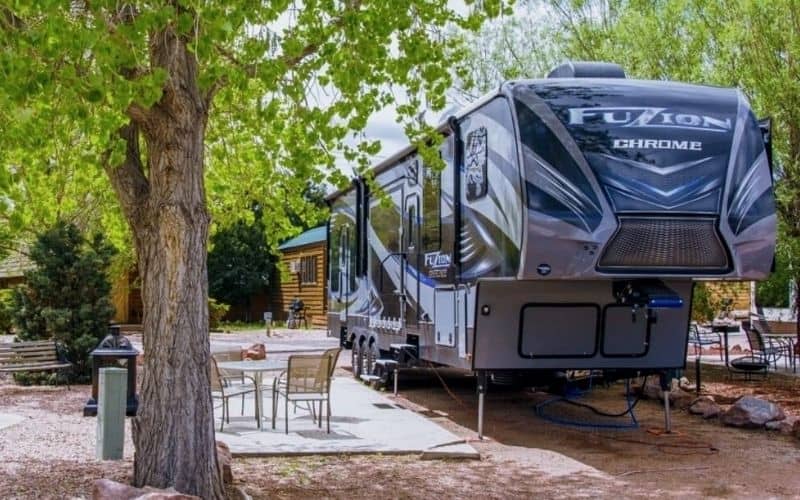
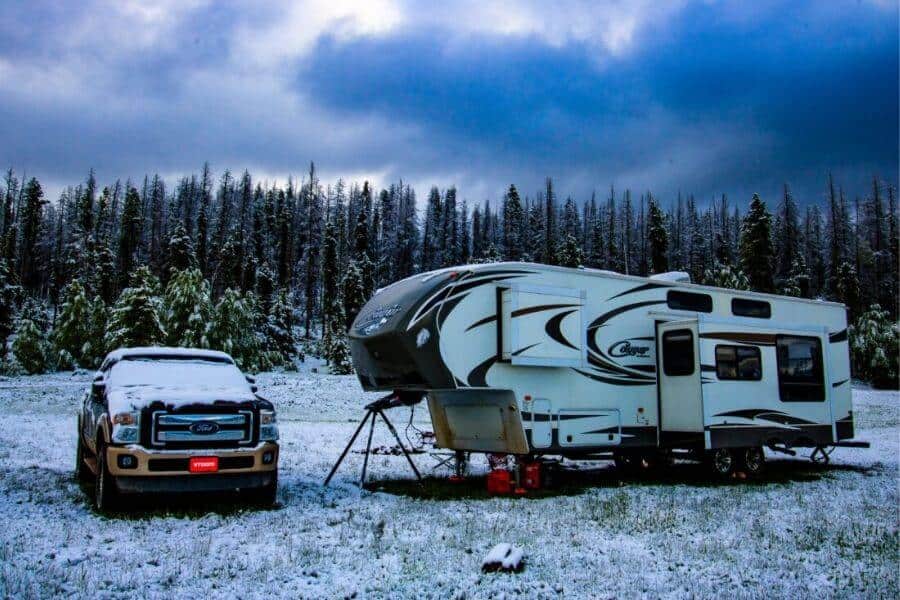
4 Comments
Steve Prentice
3 years agoJosh – a well-written post. Thank you. I am studying everything I can about winter RV-ing in preparation for the upcoming 2021-2022 winter here in Toronto, Canada. I have read many posts and watched many YouTube videos but one point I have never seen mentioned anywhere is what to do if you want to leave your RV for a short trip such as grocery shopping, or an overnight (or longer) visit to friends/relatives etc.? What do you do then? Are you comfortable with the idea of leaving space heaters on while you go out shopping? And if you choose to leave the RV for a weekend, should you do a quick winterizing treatment with anti-freeze in the pipes? I would love to get your thoughts on this. Happy Travels! Best, Steve
Matthew Groom
2 years agoHi Steve. I would wager that you can keep the RV warm enough without the space heaters (which are notorious for starting fires) running the whole time. Water will START to freeze at 32*F/0*C, but it how quickly it freezes will depend on who much time it has to freeze. Keeping it above 40*F inside the RV while not occupied should be quite safe (and will use less propane). Also, the main way that space heaters end up starting fires is usually because people leave piles of clothing or other inflammables near them (or on them), which if you position them cautiously, will probably be perfectly safe to leave unattended for a short while.
Dixon Judd
2 years agoI’ve lived full time for 3 winters in the mountains north of Spokane, WA. where temps get below zero several times in cold snaps. One of the best solutions that is also cost effective is to use an oil filled radiator heater. Once they are at top heat out put they don’t use much electricity and will maintain an ambient inside temp while you’re away. Depending on the size of the rv more than one oil heater in different areas can work for larger rv’s. These heaters are sold in many stores or online and are reasonably priced. Hope this helps.
Mimi
2 years agoJust a tidbit to pass on. Most trailers with “winter” or “arctic” packages have no additional insulation–they are simply covered on the underside which protects piping, BUT, the warranties explicitly say that you use the furnace to make the guarantee any good. So, while we use radiant heaters, we also use our furnace which can be costly during a cold snap, but it prevents frozen piping and makes us cozy, so we do it. We keep two extra tanks at all times and leave faucets dripping at night. So far, so good (third year).